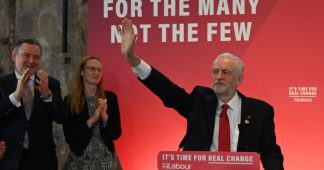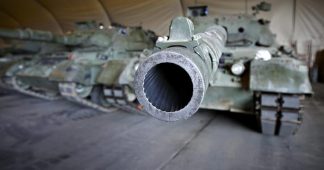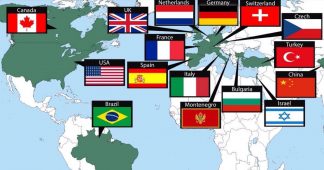By Jean Shaoul
Oct 13, 2020
According to data released by the Department for International Trade (DIT), the UK government was the world’s second biggest arms exporter behind the US between 2010-2019. Britain signed £86 billion worth of contracts for military equipment and services.
Last year, Britain exported £11 billion worth of fighter jets, radar, missiles, arms, and materiel, the second highest year for UK arms sales since 1983.
While the US was by far the largest arms exporter, accounting for 47 percent of the global arms trade, the UK accounted for 16 percent, while Russia and France had 11 percent and 10 percent respectively.
Sales were down from 2018’s £14 billion due to what DIT said was “the volatile nature of the global export market for defence.” The UK won “no major platform orders in 2019” and arms exports to Saudi Arabia were halted in June last year, following the Court of Appeal’s ruling that the UK government had failed to take into account whether Saudi airstrikes in Yemen that targeted civilians broke humanitarian law.
While the US is Britain’s largest single arms customer, most of Britain’s arms exports (60 percent) go to the Middle East, with Saudi Arabia by far the largest buyer along with Oman, Turkey, the United Arab Emirates (UAE), Qatar, Israel, Bahrain, and Egypt.
The UK government had no hesitation in greenlighting the sale of arms to countries waging war at home or abroad, including to Saudi Arabia, the Philippines, Afghanistan, UAE, Nigeria, Mexico, Iraq, Ukraine, the Democratic Republic of Congo, Kenya, and South Sudan. The list of Britain’s customers reads like a roll call of the most corrupt and blood-soaked regimes on the planet.
Andrew Smith of Campaign Against Arms Trade said, “These sales are not just numbers on a spreadsheet: for people around the world they could be a matter of life and death. UK-made weapons have played a devastating role in the Saudi-led bombing of Yemen.”
The UK has licensed more than £6.5 billion worth of arms to the Saudi-led coalition in the five years since March 26, 2015, when the bombing began. This is likely an underestimate as many of the bombs, missiles, and aircraft components are licensed via the opaque and secretive Open Licence system that is “more flexible” than a standard licence and “avoids the need to apply for a new licence for every export.”
According to the Armed Conflict Location & Event Data Project (ACLED), the Saudi-led war against Yemen—waged with the full backing of Washington and London—has killed over 100,000 people, mostly civilians.
The Saudi bombing campaign would have been impossible without UK weapons and logistical support, which has included providing targeting intelligence, training pilots, maintaining aircraft, and the deployment of elite Special Forces.
British-built aircraft, bombs, and missiles have been used to target civilians in breach of UK arms export law that bans the sale of arms or munitions to a state that is at “clear risk” of committing serious violations of international humanitarian law (IHL). The Ministry of Defence had logged a staggering 516 potential IHL violations by the Saudi-led coalition by July this year, even as it resumed arms sales to Riyadh after a one-year hiatus following the Court of Appeal’s ban, pending a review of the government’s vetting procedures.
The war has created the worst humanitarian crisis on the planet in what was already the poorest country in the Arab world. As well as the direct casualties of war, many more have died of hunger and disease, including as many as 85,000 children under the age of five, according to the Save the Children charity.
The UN says at least 24 million people—more than three-quarters of Yemen’s population—need aid and protection. It has been forced to cut critical aid at 300 health centres and reduce lifesaving food distribution across the country—one third of its humanitarian programmes—in the last six months due to a lack of funding. The UN warned of further drastic cuts “in coming weeks unless additional funding is received.”
Lise Grande, the UN’s humanitarian coordinator for Yemen, said the UN had received only $1 billion of the $3.2 billion needed. “It’s an impossible situation. This is the worst humanitarian crisis in the world, yet we don’t have the resources we need to save the people who are suffering and will die if we don’t help.”
Last month, the UN’s Office for the Coordination of Humanitarian Affairs (OCHA) said it would have to close its food aid programme to 12 million and health services to 19 million, because both the UAE and Saudi Arabia had failed to honour their combined pledges of $1.5 billion. Mark Lowcock, the UN’s under secretary-general for humanitarian affairs, warned that the “spectre of famine” had returned to Yemen.
The arms trade with governments at war and repressive regimes is bound up with safeguarding the billions of pounds in profits from arms sales accruing to BAE Systems and other major UK weapons manufacturers that account for around 10 percent of Britain’s declining manufacturing base.
Such is the reality of Britain’s arms licencing system, which the government routinely claims is one of the most “robust” and “transparent” in the world, that a recent Sky News investigation found evidence of Russian special forces on operations in the past two years, as well as Russian-backed Syrian rebels, using British-made sniper rifles. Both countries are at the top of the UK’s political and military hit-list. The government claims it had never approved the export of these weapons to Moscow, which has been under a European Union arms embargo since the US and EU-orchestrated coup in Ukraine that toppled the pro-Russian government in 2014.
No less a consideration in the arming of the Middle East’s repressive regimes is the Conservative government’s support for the US war buildup against Iran, that is in turn bound up with its preparations for war against nuclear-armed China and Russia. Last year, the government dispatched three warships to the Persian Gulf in support of Washington’s escalating provocations against Iran.
Last weekend, Andriy Yermak, who heads Ukrainian president Volodymyr Zelenskiy’s office, revealed in remarks at Chatham House—a UK foreign policy think tank focusing on Russia and Eurasia—that London would agree a large lethal weapons contract with Ukraine and a £1 billion loan to help Ukraine’s navy build new ships capable of use in the Black Sea.
His remarks followed Prime Minister Boris Johnson’s signing the prevoius Thursday of a major trade, political, and defence agreement with President Zelenskiy during his visit to London. Johnson said that the agreement pledged Britain’s support for Kiev’s sovereignty and territorial integrity in the face of Russia’s “malign influence, both in Ukraine and in the wider region.” Downing Street said that British troops had trained more than 18,000 members of Ukraine’s armed forces since 2015.
Ukraine has been fighting a six-year-long civil war in eastern Ukraine against Russian-backed separatists, ever since the installation in 2014 of a far right nationalist NATO-aligned government in Kiev. The civil war has claimed more than 13,000 lives, left 30,000 injured, and displaced 1.5 million people from their homes. A 2019 UNICEF report found that nearly half a million children in eastern Ukraine “face grave risks to their physical health and psychological well-being” as they attend bullet-ridden schools and walk through fields of land mines.
The war plans of the imperialist powers can only be thwarted by the mobilization of the international working class in a struggle against war and its source, the capitalist system.
Published at https://www.wsws.org/en/articles/2020/10/14/brar-o14.html











